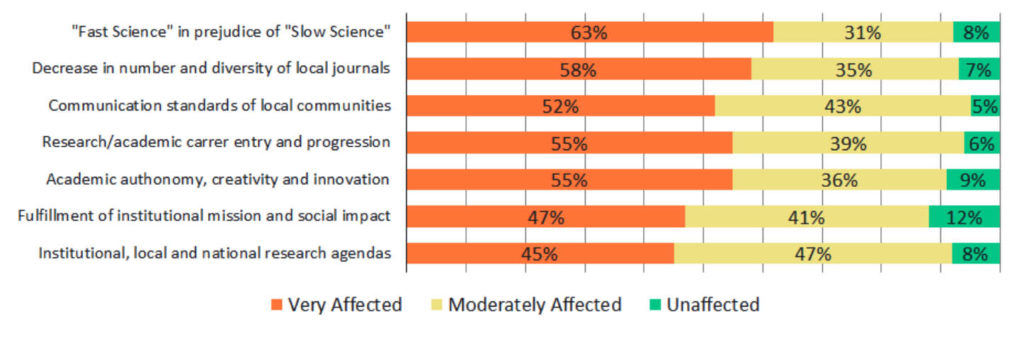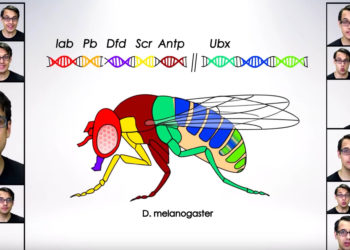Editor’s Note: Today’s post is by Ana Heredia and Eloisa Viggiani. Ana is a former researcher turned scholarly communications specialist. Eloisa is a specialist in bibliographic databases and science evaluation, providing analysis, insights and recommendations around science evaluations and the responsible use of indicators for the assessment of research institutions and individual researchers.
There is a changing wind blowing from Latin America, in terms of the role of scholarly publishing in the evaluation of science. On September 15, 2021, the Latin American Association of Scientific Editors (ALAEC) was created, through the efforts of three national associations: the Brazilian Association of Scientific Editors — ABEC Brasil; the Colombian Association of University Presses – ASEUC; and the Uruguayan Association of Academic Journals — AURA. Their ongoing work was boosted by a 10-person international and interdisciplinary working group with the same idea.
ALAEC was officially launched during LATMÉTRICAS 2021: LATmetrics y el Simposio Latinoamericano sobre Estudios Métricos en Ciencia y Tecnología, which attracted more than 600 participants, mainly researchers who are thinking about research evaluation from the Latin American perspective. A bilingual event (Spanish and Portuguese), organized collaboratively by researchers from different countries, it was put together by Universidad de Antioquia, and sponsored by ABEC Brasil, ASEUC, SciELO, the Latinamerican Council of Social Sciences – CLACSO, Dialnet, Universidad Nacional de Colombia and Universidad EAFIT. It offered a space for a common dialogue within Latin America about the role of metrics in national systems of scientific evaluation, as well as an exploration of knowledge maps, trends, the development of metrics on the role of science and technology in social transformation, and – importantly — the role of the region’s scientific journals (the majority of which are published in public universities) in evaluation.

During the conference, participants were invited to reflect on the use of metrics for science evaluation, and how to respond to the growing pressure on scientific journals that comes from both the international quality paradigm (measured through citation impact indicators, with strong influence from commercial companies that own bibliographic databases), and from evaluation agencies that use journal ranking criteria for the purpose of distributing resources for research and higher education.
To help evaluate interest in the idea of a regional association and to better understand editors’ perspectives on the use of journal metrics for science evaluations, a survey of journal editors was carried out, with 20 questions aimed at characterizing the journal they edit, such as subject area(s), audience, business model and adoption of open science, coverage by databases, strategies for increasing visibility, and use of metrics and indicators for journal management. The survey also included four questions about the use of citation impact indicators for national evaluations of science performed by governmental agencies in Latin America and their effects on the publication and research activities in the region.
The survey was sent to editors belonging to the three regional associations, as well as being open to the wider community. We would like to highlight here some of the interesting insights derived from the 342 responses from editors in a total of 14 Latin American countries.
The majority of editors responding are responsible for journals that are:
- Academic and public – they are owned by public universities (67%) and their main audiences are academic researchers and students (80%)
- Open access – 91% are fully OA and 88% do not charge an APC — they are Diamond OA journals, where neither the author nor the reader has to pay
- Not included in international indexes – 80% are not indexed in Web of Science or Scopus but are rather indexed in regional databases as Latindex (62%)
A large majority of the editors who responded to the survey felt that the use of citation impact indicators for evaluating science in Latin America is inadequate or partially adequate (70%-88% depending on the specific area of evaluation), as seen in Figure 1.

When questioned about how key dimensions of science would be affected by the use of journal impact metrics for evaluations, over half of the respondents felt that there would be an adverse effect in five of the seven areas identified, most notably in terms of “fast science” in prejudice of “slow science” and a decrease in the number and diversity of local journals, as seen in Figure 2.

This feedback was used to support the development of the ALAEC Manifesto for the responsible use of metrics in research evaluation in Latin America and the Caribbean, which calls for a more inclusive and responsible use of journal-based metrics in research evaluation. It supports previous manifestos, such as the San Francisco Declaration on Research Assessment – DORA (2012), the Leiden Manifesto for Research Metrics (2015), and the Helsinki Initiative on Multilingualism in Scholarly Communication (2019). Acknowledging that the current criteria imposed by Latin American evaluating bodies have perverse consequences for the region’s journals and that authors will therefore have less incentive to submit articles to them, the manifesto has five main calls to action:
- Re-establish quality criteria, valuing journals that:
- Publish relevant research regardless of area or subject matter, language, target audience, or geographic scope
- Bring a broad spectrum of scholarly and research contributions, such as replication, innovation, translation, synthesis, and meta-research
- Practice open science, including open access
- Adopt high ethical standards, prioritizing quality and integrity in scientific publication
- Value and stimulate the work of scientific editors and their teams, promoting their training and development, and recognizing their fundamental role in the adoption and dissemination of good practices in scientific publication.
- Ensure that national journals and publishers do not lose financial incentives and the flow of article submissions, allowing them to achieve and maintain high standards of quality and integrity in their editorial processes, especially for journals that practice open science and multilingualism.
- Strengthen, disseminate, and protect national and regional infrastructures for scientific communication (SciELO, RedALyC, LatIndex, LA Referencia, and non-commercial CRIS systems), that favor open science and multilingualism, and that can generate the most appropriate metrics and indicators to evaluate local and regional science.
- Encourage and value collaborative networks and exchanges between all actors in the ecosystem of knowledge production and dissemination: institutions, authors, reviewers and funding agencies, etc., in the region.
At the end of the official presentation of the Manifesto, the audience had the opportunity to ask questions and share their points of view. Several people highlighted the importance of having national associations of scientific editors in every country and, at the same time, reinforcing regional cooperation to joint strengths, efforts, and work together. The importance of recognition and professionalization of the whole editorial team, as well as for editors to have a knowledge of metrics and their implications was also mentioned several times. Also, to prioritize the professionalization of Latin American journals, so indexing is improved, authors are motivated to submit to these journals, increasing their visibility. Another recurring issue was the difficulty of establishing a closer dialogue with Science, Technology, and Innovation Ministries, which should promote more inclusive discussions, involving journals, to emphasize and support national journals’ visibility, internationalization and promotion of results at national and international levels.
Currently, ALAEC’s founding group – all the signatories of the Manifesto — is working to consolidate the organization, through the establishment of a management group that will set up the basis for next steps, like strategic and action plans, ALAEC’s statute, the upcoming launch of the official website, and the first ALAEC meeting, to happen in 2023.
In the words of Prof. Sigmar Rode, President of ABEC: “The idea is that each country has its own scientific editors association, including all those involved in scientific publishing. ALAEC’s idea is to make sure that every country advances in their editorial processes. Working together and growing together. When we have such a high level association, involving the whole Latin American region, we are stronger to dialogue with Ministries in our countries.”
Prof. Lorena Ruiz, Treasurer of the Colombian ASEUC, agreed and added that: “science evaluation should not focus on journals, and more attention should be paid to the individual article and the quality of its data”. Prof. Ruiz highlighted that the “journal’s mission goes beyond indexing, and the academic publishing community needs to know which science evaluation metrics are needed, and what role journals play in the evaluation system.”
Prof. Karina Patrón, from the Uruguayan AURA, thinks that an investment should be made in developing, interpreting, and using journal metrics. Currently, national science systems of the region incentivize authors to publish in “high impact” journals; publications in journals indexed in SciELO, for example, count for less than half of the former. “Publishing in high impact journals allows researchers to score higher in evaluations, which has an impact in the evolution of the research career.”
The creation of ALAEC is a memorable achievement for the Latin American scholarly communication ecosystem, but there is plenty of work ahead. There are many challenges to be faced, but we strongly believe in the power of the collective work of committed individuals, a fast-developing and open regional information infrastructure, and a well-defined agenda with widespread buy-in.



